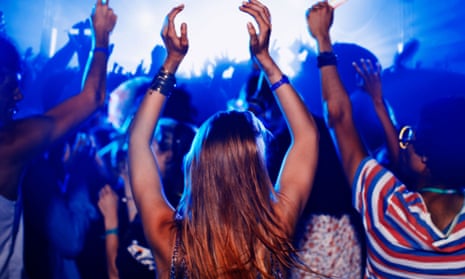At the Pxssy Palace party in Mick’s Garage, the music is banging, the outfits are flamboyant and the vibe is fun. On the wall hangs a bold manifesto: “Body shaming, slut shaming, racism, ableism, ageism, tranphobia, homophobia, xenophobia and fatphobia are not tolerated,” it says. “Please do not assume anyone’s gender – if in doubt, feel free to ask.”
Signs like this one – in Mick’s in Hackney, east London – are increasingly common. Whereas it was once cool to be purely hedonistic, now, with more than a quarter of 16-24-year-olds deciding not to drink and political parties, gender-neutral toilets and free cabs home for transgender people of colour becoming widespread, clubland is being cleaned up as millennials look for safe experiences.
Music festivals are going in the same direction – 45 international events, including Worldwide and Kendal Calling, have pledged a 50/50 gender split in their lineups.
“When young people nowadays go clubbing they like clean, unthreatening places,” said Tom King, co-founder of the record label No Pain in Pop, who thinks that the politics does not take away from the fun. “Drug testing and mixed toilets are pretty widespread and everything is quite sanitised. There’s definitely been a big, big change.”
So, is the blissed-out rave a thing of the past? Perhaps, says Alice Favre, director and event manager of LWE, which works with London venue Printworks and festivals such as Junction 2. She says dance music culture is changing with the times. Clubbing has become less of a weekly habit because of the expense. Instead, people plan months in advance.
“People are choosing their experience more carefully and looking for places that fit their ideology,” she said. “There is a growing expectation for better behaviour in clubbing culture ... with ravers reporting attendees who are not behaving as they are expected to.”
As a result [LWE’s] parties have recently implemented a strict anti-harassment policy, including large warning posters at all events. “Instances of harassment are now easily reported, and perpetrators get ejected,” she said.
Policies such as this are becoming the norm. “You can no longer put together a club night with minimal effort and consideration, turning a blind eye when problems arise,” said Gabriel Szatan, 26, presenter and programmer at Boiler Room TV. “I understand not every venue can afford to have unisex loos and provide additional care for transgender ravers, but given that most promoters, DJs and venue owners are still predominantly white men, it’s critical for people to check their own assumptions when putting on a night.”
One explanation is to be found in the age of the promoters, many of whom are in their 20s. There have always been politicised young people, but now they are the ones booking festivals.
Room for Rebellion is a sister group of the London-Irish Abortion Rights Campaign, which runs synchronised events in London, Dublin and Belfast. Its “political parties” raise money as well as awareness. “We’ve created a space which allows stories to be told, free from stigma, on the dancefloor,” said co-founder Isis O’Regan, 25. She says millennials like her want a clubbing experience that can be carefree, as well as supportive, and nights like these create communities that might not exist elsewhere.
With dance music more prominent on the airwaves now than at any time in the past decade, promoters are conscious that attending club nights is no longer a left-field endeavour and that they need to be accessible to everyone.
Working with Manchester People First, a charity for adults with a learning disability, the promoter Meat Free runs nights for dance music fans whose disabilities preclude them from attending mainstream events. They feature less intense lighting, a lower volume of music and a lower capacity.
“We play house and disco throughout, and just lay off the techno so it doesn’t get too intense,” says promoter Alice Woods, 32. “We want it to be fun, open and welcoming.”
Some say the relationship between clubbing and activism has been building for a few years and is part of a broader trend. Social consciousness is a key part of creativity in 2018, and DJs such as The Black Madonna and Midland, who are outspoken on issues such as gender, race and sexuality, have helped make it mainstream to be right on.
“This rubs off on other DJs too,” said one DJ, who preferred not to be named. “Raving is still very much about getting on it, but this is part of a much broader ‘woke’ [being aware of social issues] trend and it’s just playing out in dance music. This is a reaction to Europe lurching to the right, our government and Brexit, and having Trump in the White House.”
Others think this is nothing new. Bill Brewster, co-author of Last Night a DJ Saved My Life, a history of disc jockeys, says there’s always been activism in dance music. “Acid house was anti-Thatcher,” he said. “When organising an illegal after-party, people felt like they were building an alternative society.” He thinks there will always be a commercial side to clubbing, as well as the anti-authoritarian stance.
But is this new inclusivity excluding certain people? “Potentially,” said King. “But I’d say it’s almost all positive. It has certainly been cleaned up and some of the bad stuff has been rooted out. The general quality of clubbing has improved.”

Comments (…)
Sign in or create your Guardian account to join the discussion